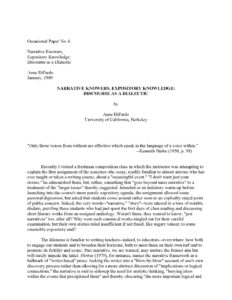Narrative Knowers, Expository Knowledge: Discourse as Dialectic
Excerpt
Few would dispute that the best thinking and writing is at once personal and public, both infused with private meaning and focused upon the world beyond the self. The goal of writing teachers is of course to help students learn to negotiate between the two, to locate those dynamic points of connection where experience gives rise to inquiry. Why, then, the tenacity of the schism–“mere anecdote,” “just stories,” on the one hand, “objective” “reasoned” exposition on the other? Notwithstanding the often eloquent dissent of those favoring the personal narrative, most composition instructors locate the center of their task in promoting facility with academic writing in all its various guises, a goal which leads of necessity toward the expository. And yet, many practitioners remain at heart somewhere in the middle of the continuum, feeling the resonance of objections like Rosen’s, but duty-bound to address, as expediently as possible, their students’ immediate needs. While allowing that stories afford children a wonderful first encounter with the written word, the assumption is still commonly held (if tacitly, in many cases) that the narrative is something one “grows out of as cognitive maturity allows abstract, reasoned, depersonalized exposition to emerge.” Although empirical evidence for such a claim remains scant, much instruction continues to be aimed toward fostering a sort of “grand leap” away from narrative and into the presumably more grown-up world of exposition.


